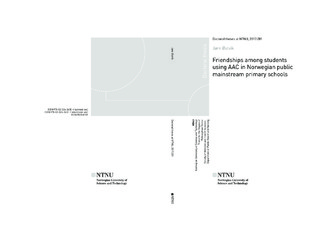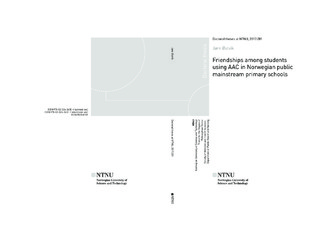| dc.contributor.advisor | Ytterhus, Borgunn | |
| dc.contributor.advisor | Balandin, Susan | |
| dc.contributor.author | Østvik, Jørn | |
| dc.date.accessioned | 2017-11-13T13:02:36Z | |
| dc.date.available | 2017-11-13T13:02:36Z | |
| dc.date.issued | 2017 | |
| dc.identifier.isbn | 978-82-326-2631-1 | |
| dc.identifier.issn | 1503-8181 | |
| dc.identifier.uri | http://hdl.handle.net/11250/2465838 | |
| dc.description.abstract | Vennskap regnes som en av de mest betydningsfulle sosiale relasjoner gjennom livet, og skolen er en viktig arena for barns utvikling av vennskap. På tross av at det er gjort betydelig forskning om vennskap blant elever uten funksjonsnedsettelser, har få studier utforsket vennskap blant elever som helt eller delvis mangler et funksjonelt talespråk og som dermed er avhengig av alternativ og supplerende kommunikasjon (ASK).
Denne studien har hatt som mål å få en større forståelse av vennskap blant elever som bruker ASK i den ordinære, norske offentlige skolen på de lavere trinnene. Studien baseres på følgende forskningsspørsmål: (1) Hva karakteriserer vennskap mellom elever som bruker ASK og deres medelever? (2) Hva slags faktorer i skolemiljøet influerer på vennskap mellom elever som bruker ASK og deres medelever? (3) Hvilken rolle har elever som bruker ASK, medelever, foreldre til elever med ASK og skolepersonale i utviklingen av vennskap blant elever som bruker ASK? Studien består av to deler: en systematisk litteraturstudie og en empirisk studie av sju elever som bruker ASK. Resultatene fra studien er rapportert i fem artikler. Datamaterialet fra den empiriske studien omfatter semi-strukturerte intervjuer av elever som bruker ASK, medelever, foreldre til elever som bruker ASK og skolepersonale. Transkripsjonene er analysert med utgangspunkt i en konstruksjonistisk grunnet teori tilnærming.
Resultatene fra den empiriske studien dannet grunnlaget for utviklingen av en grunnet teori om vennskap blant elever som bruker ASK, basert på sju konseptuelle kategorier. Den grunnede teorien omfatter forutsetninger for elevenes vennskap på følgende tre nivåer: (1) Det organisatoriske og strukturelle nivået (manglende omforente rammer, ambivalens og motsetninger om strukturer, og elever som besøker klassen). (2) Det interpersonlige nivået (interaksjonelle fasilitatorer og barrierer). (3) Det intrapersonlige nivået (kvalifiserer for vennskap, demonstrerer tydelige preferanser). Forutsetningene på alle tre nivåer influerer utviklingen av få, nære sosiale relasjoner blant elevene som brukte ASK. Diskusjonen av studiens resultater omfatter teoretiske implikasjoner, empiriske implikasjoner, skolepolitiske implikasjoner, og metodologiske refleksjoner. | nb_NO |
| dc.description.abstract | Friendships are one of the most important social relationships in life, and the school is an important arena where children establish these. Despite the extensive research on friendships among students without disabilities, very few studies have explored the friendships among students with little or no functional speech who rely on augmentative and alternative communication (AAC).
The aim of this study was to achieve a deeper understanding of friendships among students who use AAC in the Norwegian primary mainstream public school. It addressed the following research questions: (1) What characterizes friendships between students using AAC and their fellow students? (2) What factors in the school environment affect friendships between students using AAC and fellow students? (3) What is the role of students using AAC, fellow students, parents, and staff in the development of friendships among students who use AAC? The study consists of a systematic literature review and an empirical study of seven students using AAC. The results are reported in five papers. The data in the empirical study included semi-structured interviews with students using AAC, fellow students, parents of students using AAC, and staff. The transcriptions were analyzed using a constructivist grounded theory approach.
The results from the empirical study formed the basis for the development of a grounded theory on friendships among students using AAC, informed by seven conceptual categories. The grounded theory includes preconditions for the students’ friendships at the following three levels: (1) The organizational and structural level (i.e., lacking common purpose, ambivalence and contradictions about structures, and visiting fellow students). (2) The interpersonal level (i.e., interactional facilitators and barriers). (3) The intrapersonal level (i.e., qualifying for friendships, demonstrating clear preferences). The issues at all levels influenced the development of few close social relationships among the students who used AAC. The discussion section includes theoretical implications, empirical implications, policy implications, and methodological reflections. | nb_NO |
| dc.language.iso | eng | nb_NO |
| dc.publisher | NTNU | nb_NO |
| dc.relation.ispartofseries | Doctoral theses at NTNU;2017:281 | |
| dc.relation.haspart | Paper 1: Østvik, J., Ytterhus, B., & Balandin, S. (2016). Friendship between children using augmentative and alternative communication and peers: A systematic literature review. Journal of Intellectual & Developmental Disability, 1-13.
- Is not included due to copyright available at http://dx.doi.org/10.3109/13668250.2016.1247949 | nb_NO |
| dc.relation.haspart | Paper 2: Østvik, J., Balandin, S., & Ytterhus, B. (2017). A “Visitor in the Class”: Marginalization of Students Using AAC in Mainstream Education Classes. Journal of Developmental and Physical Disabilities, 29(3), 419-441.
- Is not included due to copyright available at http://dx.doi.org/10.1007/s10882-017-9533-5 | nb_NO |
| dc.relation.haspart | Paper 3: Østvik, J., Balandin, S., and Ytterhus, B. Interactional facilitators and barriers in social relationships between students who use AAC and fellow students. - Is not included | nb_NO |
| dc.relation.haspart | Paper 4: Østvik, J., Ytterhus, B., and Balandin, S. (2017). “So, how does one define a friendship?” : Identifying friendship among students using AAC in inclusive education settings. European Journal of Special Needs Education, 1-15. -
Is not included due to copyright available at doi:10.1080/08856257.2017.1312799 | nb_NO |
| dc.relation.haspart | Paper 5: Østvik, J., Ytterhus, B., and Balandin, S. Gateways to friendships among students who use AAC. - Is not included | nb_NO |
| dc.title | Friendships among students using AAC in Norwegian public mainstream primary schools | nb_NO |
| dc.type | Doctoral thesis | nb_NO |
| dc.subject.nsi | VDP::Medical disciplines: 700::Health sciences: 800::Community medicine, Social medicine: 801 | nb_NO |

